The 10 Films of 2016
Selected by Paul Stathakis | February 14, 2017
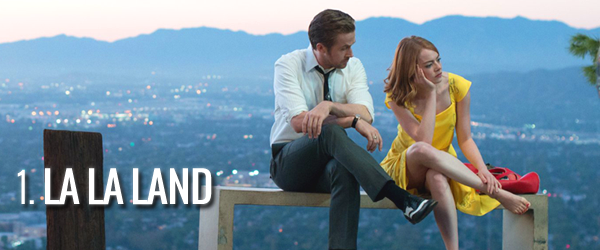
A grand musical for the ages. They just don’t make pictures like “La La Land” anymore. There’s a little something for everyone to admire here. It’s infused with energy, vigor, optimism, passion, romance, charm, and drama. It’s classic Hollywood at a time when Hollywood needs it the most. It stars the charming Emma Stone and the handsome Ryan Gosling. The two are irresistibly in tune and their chemistry is the biggest driving force behind the film’s perfection. This is their third film together and hopefully not their last. Like Humphrey Bogart and Lauren Bacall in the past, this onscreen pairing is an enduring one. “La La Land” tells the story of a jazz pianist and a struggling actress chasing love and dreams in a big city filled with many other dreamers. Behind the camera is Damien Chazelle who, in 2014, directed the exhilarating film “Whiplash.” Chazelle is fairly young and yet he’s making the kind of films that only a mature and confident director would achieve at the height of their career. Chazelle, besides having a profound love for jazz (he was a jazz student), also admires cinema. It’s not just evident in the pictures and posters that cover the apartment and building walls but there are many indirect homages to classic musical films as well like “Singin’ In The Rain”, “West Side Story”, “Sweet Charity”, and “Shall We Dance” to name a few. Making a musical is no easy feat. Ryan Gosling had to learn to play the piano for this part and both actors had to prepare vocally and choreographically. Add to that original music that is intoxicating and unforgettable (you will find yourself humming these tunes long after you’ve seen the film). Experience “La La Land” on the big screen. Whenever a classic film would open with the Cinemascope logo, it meant that viewers were in for a real visual treat and “La La Land” honors that very tradition.
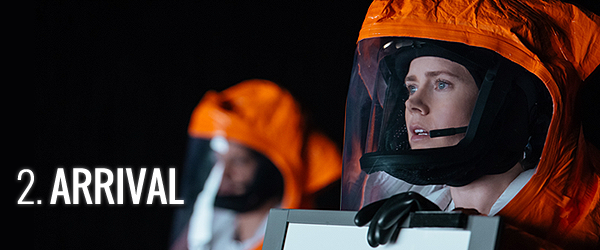
Denis Villeneuve, like Damien Chazelle, is part of that group of Hollywood’s next generation of big filmmakers. “Arrival” is his fourth American film and one of the best science-fiction thrillers we’ve seen in years. It features wonderful performances by Amy Adams and Jeremy Renner as specialists in their respective fields (one is a linguist and the other, a military scientist) who agree to help the U.S. military understand why strange spacecrafts have arrive and docked on Earth. The scenes which take place inside the spaceship are visually arresting, mysterious, and thrilling. As viewers we have the same fears as the members aboard. We are there with them every step of the way as they investigate and, in the process, risk their lives for answers. This is a movie that doesn’t hurry to offer explanations. Realistically, we’d likely move at the same pace to reach an understanding. This is a science-fiction adventure that is confident but that requires thinking and it hits all the right notes leading up to its surprise ending.
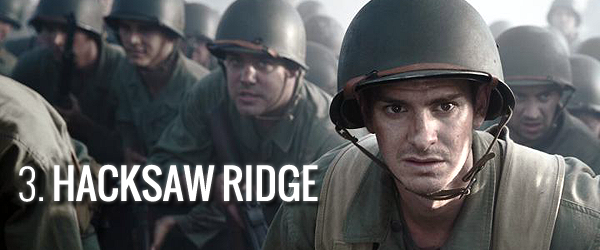
At its World Premiere in Venice, Mel Gibson received a ten minute standing ovation. It’s not difficult to understand why. “Hacksaw Ridge” tells the true story of Private Desmond T. Doss (Andrew Garfield) who saved the lives of 75 men during the battle of Okinawa, one of the bloodiest battles of World War II. What is most remarkable about Doss’ story is that he achieved this without firing a single shot. There’s a reason behind Doss’ refusal to carry and use a weapon on the battleground. I won’t reveal it here. Andrew Garfield delivers a noteworthy performance (his best) as a brave and determined combat medic. Teresa Palmer, who stars as Doss’ supportive wife, is equally delightful. There are also great supporting performances by Vince Vaughn, Sam Worthington, and Hugo Weaving. This is a war film. Yes, many of the battle scenes are violent and difficult to watch. But don’t let that discourage you from seeing this picture. The brutality of battle is a secondary theme. “Hacksaw Ridge” is about the absurdity of war.

Dev Patel has come a long way since “Slumdog Millionaire.” This is the kind of role he could only play at this mature stage in life. Gone are his boyish features. Instead, we have the portrait of a man afflicted by his past, curious about it and determined to confront it at all costs. If you’ve seen the ads for “Lion”, then you know all about the story of a boy who at a young age is lost and ultimately separated from his family. Years later he is adopted by a family in Australia. But then comes a reminder which triggers a hunger for answers. The boy, now a man, wants to know where he came from and wants to know what happened to his mother and brother. “Lion” was one of the year’s most moving films. This journey brings us many surprises, uplifts us, makes us feel good to be together and good to be alive. It serves as a reminder of how powerful film can be.
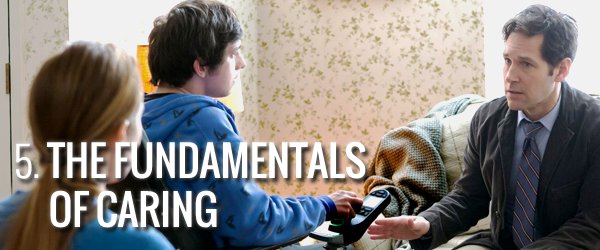
This is America’s answer to France’s 2012 film “Intouchables” and it’s every bit as engaging, touching, and fun. It stars Paul Rudd as a caretaker of a young man confined to a wheelchair. What begins as a an awkward encounter quickly develops into a strong friendship. Rudd is a versatile performer and he seems to be testing himself as an actor with each role that he undertakes. He understands, perhaps better than any other comedic actor working today, the delicate balance of being comical and serious. His timing is impeccable and his co-star, Craig Roberts, carries himself similarly in a wonderfully challenging role. This results in us caring immensely about the fate of these characters. What pain are they concealing? What has made them the strong people that they are? What is it that makes them connect so well? We want to know and, as the film progresses, we get subtle but satisfying answers. Selena Gomez, known chiefly as a singer, surprises with a genuine supporting role that elevates the film and successfully strips her from her innocent persona. In the end, the film makes the case that, sick or not, impaired or not, everyone can use a little caring at some point in their life to rise above struggles and find the strength to carry on. Those, in essence, may very well be the truest fundamentals of caring.
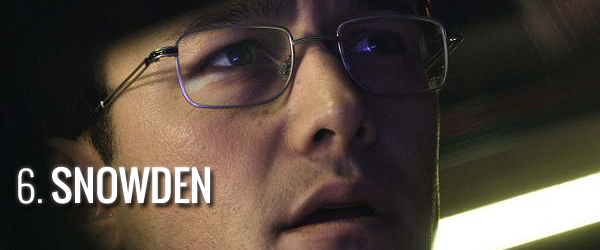
We already knew that director Olivier Stone wasn’t afraid to make controversial films but for him to make a film like “Snowden” this late in his career is surprising. Joseph Gordon Levitt stars as former NSA agent and whistle-blower Edward Snowden who, in 2009, exposed one of the U.S.‘s most controversial espionage programs. It made a lot of noise, with the population raising questions about privacy. It also created a media frenzy which led the U.S. to essentially disavow Snowden for what they believed was an act of betrayal and treason. Levitt as Snowden is perfect, from his mannerisms to his voice. From certain angles and close-ups, you’d swear it was the real Snowden. The beautiful Shailene Woodley is charming as Snowden’s supportive girlfriend. The scene where photographs a stroll with Levitt in Washington is sincere and real. It takes us away from thinking about the weight that Snowden will carry on his shoulders later in the film. Leave it to Stone to direct and tell a complex story with expertise, simplicity, and the right amount of pulse-pounding thrills. You can never quite get too comfortable in a film like “Snowden” and that’s undoubtedly the point. I assume that when you’re an NSA agent, what you learn can be problematic. Paranoia is just a tiny part of the consequences that come with knowing. The film also features one of my favorite shots of the year: Snowden exiting the NSA building, a Rubik’s cube in hand, a smile on his face, and the comfort of the sunlight ahead. He can see the light and, fortunately, so can we.
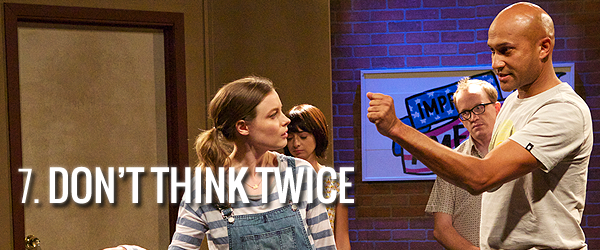
This is a small but warm comedy that wears its heart right on its sleeve. It’s about a New York improv troupe with each member (many of them not well-known actors) aspiring to land an audition with Weekend Live (which really represents Saturday Night Live). It helps that these comics are incredibly likable and funny. They are hopeful and they support each other even though, deep down inside, they realize that they won’t all find the same success. For these reasons and personal ones which surface throughout, we want to see them succeed. The film also makes a statement on how humor can remedy just about any situation including some of life’s bleaker moments. These characters always see the silver lining despite the many hits and rejections that they are forced to deal with. “Don’t Think Twice” is not the most original comedy ever made but it has a big heart, characters that we can relate to and, like a great stand-up performance, it leaves us yearning for more.
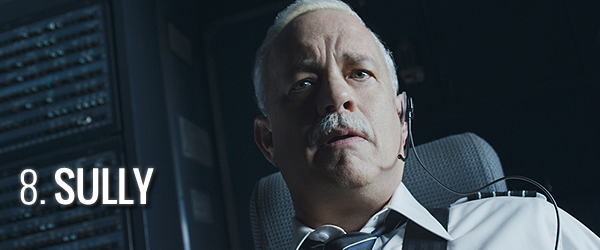
It happened on a cold January day in 2009. A distress call was made from a United Airways pilot. He informed the tower of his dilemma. Both engines of his aircraft were struck by birds causing them to fail at 2800 feet and leaving 5 crew members and 150 passengers little chance of survival,. It would require a miracle to survive. And that’s precisely the kind of phenomenon that occurred when Captain Chesley Sullenberger (played by Tom Hanks) along with his co-pilot, First Officer Jeffrey Skiles (Aaron Eckhart), safely landed the doomed plane on the Hudson River. “No one has ever trained for an incident like that. No one,” says the brave captain. No, absolutely nothing can prepare someone for this kind of situation. Simulators are useful for training but real-life is faster, more dangerous, calls for split-second decisions, and offers no second chances. This is the story of how one determined captain and his co-pilot seized every second of their one and only opportunity to pull off a miracle. The film looks at the incident but focuses mainly on its aftermath. Pilots who have been in similar situations, like Commander Robert Piche, are often blamed for having contributed to the incident in some way, big or small. Insurance companies, unlike the passengers and families whose lives have been saved, often overlook the bravery of the men at work. Tom Hanks is, unsurprisingly, moving in his portrayal here. In one scene where he tells his wife that he tried to do the best he could, we hear the pain in his voice and we notice the tremor in his stance. Only skilled actors like Hanks can be this good. With “Sully,”, director Clint Eastwood wants the world to see Captain Sullenberger for what he truly is: a hero.
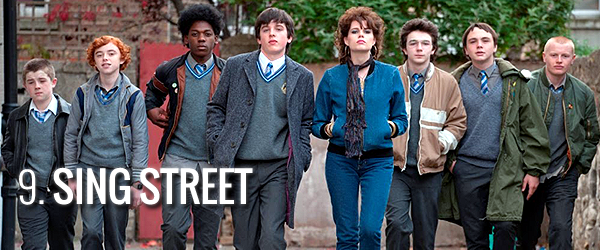
“Sing Street” was one of the year’s easiest films to cheer on. There’s not a single character in this film that doesn’t belong. And astonishingly enough, the lead actor is a 17 year old boy named Ferdia Walsh-Peelo with incredible acting talents. This is a potent film that says a great deal about being young, free, and ambitious. Critics have said that its style and tone resemble those of a John Hughes film and I agree. “Sing Street” is “The Breakfast Club’s” distant cousin. It deals with students who are somewhat, though early, at a crossroad in their life. They have their share of fears and hardships to deal with but, like we all do while growing up, they learn to cope with them as they move along. They find empowerment in music and it brings them to the realization that if you slow down and think, you can certainly see things and articulate (through lyrics especially here) a whole lot clearer. A film like “Sing Street” doesn’t need to be controversial and yet it goes out of its way to address several key issues such as bullying, class, abuse, divorce, and that crazy little thing called love. Look no further for an intelligent film that will make you smile and reminisce about how fun it was, for a time, to believe that we could be and do anything.
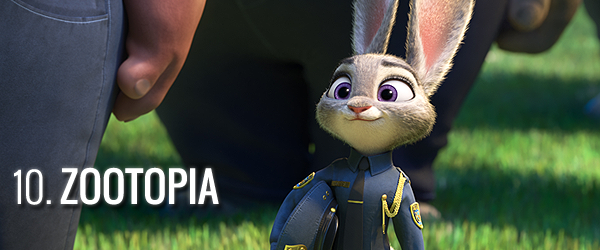
When we think about Disney, we recall many of the films that marked our childhood. My favorite remains “Beauty & The Beast.” Now comes “Zootopia”, a film so well made it’s like watching Looney Tunes on a Saturday morning. This is a cute animation film but also an intelligent one that children and adults will surely appreciate. Instead of trying to be overly colorful from a visual standpoint, it places more emphasis on dialogue, story, and humor. And, speaking of humor, one particular scene stands out involving a sloth. It’s so good that it doesn’t lose any of its funniness with repeated viewings. The story is centered on a female bunny, Juddy Hopps (voiced by Ginnifer Goodwin), with dreams of becoming Zootopia’s first ever female cop. Disney must be commended for making a film that also tackles pressing issues like gender equality, bullying, appearance, and the notion of respecting and living in harmony with another despite our individual differences and beliefs. At one point, Hopps observes that, “Life’s a little bit messy. We all make mistakes. No matter what type of animal you are, change starts with you.” “Zootopia” is one of those animated films, like “Over the Hedge”, that attributes great importance to small smile-worthy details such as big store name changes like “Mousy’s” filling in for Macy’s and “Targoat” representing Target. The name changes reflect the context to a T. It’s rare to see it done this well. In fact, “Zootopia” wants to greatly resemble reality. In one scene, a police chief (voiced by Idris Elba) claims that, “Life isn’t some cartoon musical where you sing a little song and all your insipid dreams magically come true.” An animated character commenting on how life isn’t some cartoon? I can’t think of any other animated film that’s ever tried to separate itself from what it is. It’s truly brilliant.
© 2017 by Paulzeye.com. All rights reserved
